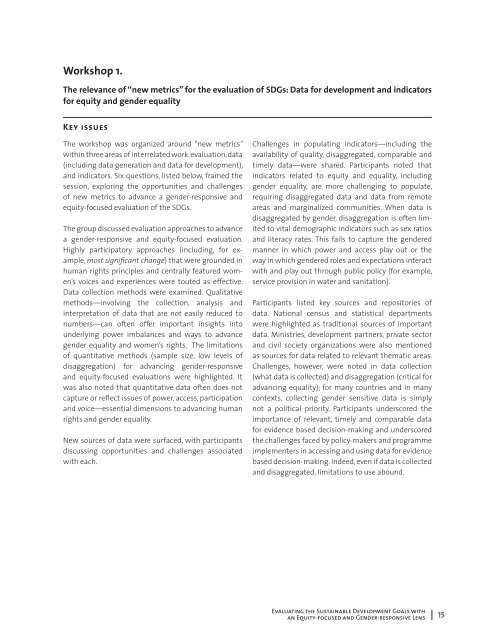NO ONE LEFT BEHIND
NY-Events-Report_WEB
NY-Events-Report_WEB
You also want an ePaper? Increase the reach of your titles
YUMPU automatically turns print PDFs into web optimized ePapers that Google loves.
Workshop 1.<br />
The relevance of “new metrics” for the evaluation of SDGs: Data for development and indicators<br />
for equity and gender equality<br />
Key issues<br />
The workshop was organized around “new metrics”<br />
within three areas of interrelated work: evaluation, data<br />
(including data generation and data for development),<br />
and indicators. Six questions, listed below, framed the<br />
session, exploring the opportunities and challenges<br />
of new metrics to advance a gender-responsive and<br />
equity-focused evaluation of the SDGs.<br />
The group discussed evaluation approaches to advance<br />
a gender-responsive and equity-focused evaluation.<br />
Highly participatory approaches (including, for example,<br />
most significant change) that were grounded in<br />
human rights principles and centrally featured women’s<br />
voices and experiences were touted as effective.<br />
Data collection methods were examined. Qualitative<br />
methods—involving the collection, analysis and<br />
interpretation of data that are not easily reduced to<br />
numbers—can often offer important insights into<br />
underlying power imbalances and ways to advance<br />
gender equality and women’s rights. The limitations<br />
of quantitative methods (sample size, low levels of<br />
disaggregation) for advancing gender-responsive<br />
and equity-focused evaluations were highlighted. It<br />
was also noted that quantitative data often does not<br />
capture or reflect issues of power, access, participation<br />
and voice—essential dimensions to advancing human<br />
rights and gender equality.<br />
New sources of data were surfaced, with participants<br />
discussing opportunities and challenges associated<br />
with each.<br />
Challenges in populating indicators—including the<br />
availability of quality, disaggregated, comparable and<br />
timely data—were shared. Participants noted that<br />
indicators related to equity and equality, including<br />
gender equality, are more challenging to populate,<br />
requiring disaggregated data and data from remote<br />
areas and marginalized communities. When data is<br />
disaggregated by gender, disaggregation is often limited<br />
to vital demographic indicators such as sex ratios<br />
and literacy rates. This fails to capture the gendered<br />
manner in which power and access play out or the<br />
way in which gendered roles and expectations interact<br />
with and play out through public policy (for example,<br />
service provision in water and sanitation).<br />
Participants listed key sources and repositories of<br />
data. National census and statistical departments<br />
were highlighted as traditional sources of important<br />
data. Ministries, development partners, private sector<br />
and civil society organizations were also mentioned<br />
as sources for data related to relevant thematic areas.<br />
Challenges, however, were noted in data collection<br />
(what data is collected) and disaggregation (critical for<br />
advancing equality); for many countries and in many<br />
contexts, collecting gender sensitive data is simply<br />
not a political priority. Participants underscored the<br />
importance of relevant, timely and comparable data<br />
for evidence based decision-making and underscored<br />
the challenges faced by policy-makers and programme<br />
implementers in accessing and using data for evidence<br />
based decision-making. Indeed, even if data is collected<br />
and disaggregated, limitations to use abound.<br />
Evaluating the Sustainable Development Goals with<br />
an Equity-focused and Gender-responsive Lens 15


